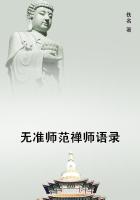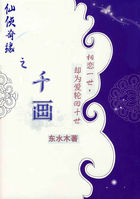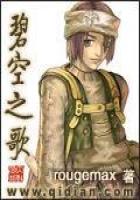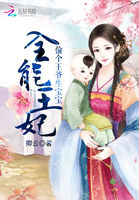Louisa Stark had been on the verge of a nervous breakdown in spite of her iron constitution and her great will power. No woman can teach school for forty years with absolute impunity. She was more credulous as to her own possible failings than she had ever been in her whole life. She was cold with horror and terror, and yet not so much horror and terror of the supernatural as of her own self.
The weakness of belief in the supernatural was nearly impossible for this strong nature. She could more easily believe in her own failing powers.
"I don't know but I'm going to be like Aunt Marcia," she said to herself, and her fat face took on a long rigidity of fear.
She started toward the mirror to unfasten her dress, then she remembered the strange circumstance of the brooch and stopped short. Then she straightened herself defiantly and marched up to the bureau and looked in the glass. She saw reflected therein, fastening the lace at her throat, the old-fashioned thing of a large oval, a knot of fair and black hair under glass, set in a rim of twisted gold. She unfastened it with trembling fingers and looked at it. It was her own brooch, the cluster of pearl grapes on black onyx. Louisa Stark placed the trinket in its little box on the nest of pink cotton and put it away in the bureau drawer.
Only death could disturb her habit of order.
Her fingers were so cold they felt fairly numb as she unfastened her dress; she staggered when she slipped it over her head. She went to the closet to hang it up and recoiled. A strong smell of lovage came in her nostrils; a purple gown near the door swung softly against her face as if impelled by some wind from within.
All the pegs were filled with garments not her own, mostly of somber black, but there were some strange-patterned silk things and satins.
Suddenly Louisa Stark recovered her nerve. This, she told herself, was something distinctly tangible. Somebody had been taking liberties with her wardrobe. Somebody had been hanging some one else's clothes in her closet. She hastily slipped on her dress again and marched straight down to the parlour. The people were seated there; the widow and the minister were playing backgammon.
The librarian was watching them. Miss Amanda Gill was mending beside the large lamp on the centre table. They all looked up with amazement as Louisa Stark entered. There was something strange in her expression. She noticed none of them except Amanda.
"Where is your sister?" she asked peremptorily of her.
"She's in the kitchen mixing up bread," Amanda quavered; "is there anything--" But the school-teacher was gone.
She found Sophia Gill standing by the kitchen table kneading dough with dignity. The young girl Flora was bringing some flour from the pantry. She stopped and stared at Miss Stark, and her pretty, delicate young face took on an expression of alarm.
Miss Stark opened at once upon the subject in her mind.
"Miss Gill," said she, with her utmost school-teacher manner, "Iwish to inquire why you have had my own clothes removed from the closet in my room and others substituted?"Sophia Gill stood with her hands fast in the dough, regarding her.
Her own face paled slowly and reluctantly, her mouth stiffened.
"What? I don't quite understand what you mean, Miss Stark," said she.
"My clothes are not in the closet in my room and it is full of things which do not belong to me," said Louisa Stark.
"Bring me that flour," said Sophia sharply to the young girl, who obeyed, casting timid, startled glances at Miss Stark as she passed her. Sophia Gill began rubbing her hands clear of the dough. "Iam sure I know nothing about it," she said with a certain tempered asperity. "Do you know anything about it, Flora?""Oh, no, I don't know anything about it, Aunt Sophia," answered the young girl, fluttering.
Then Sophia turned to Miss Stark. "I'll go upstairs with you, Miss Stark," said she, "and see what the trouble is. There must be some mistake." She spoke stiffly with constrained civility.
"Very well," said Miss Stark with dignity. Then she and Miss Sophia went upstairs. Flora stood staring after them.
Sophia and Louisa Stark went up to the southwest chamber. The closet door was shut. Sophia threw it open, then she looked at Miss Stark. On the pegs hung the schoolteacher's own garments in ordinary array.
"I can't see that there is anything wrong," remarked Sophia grimly.
Miss Stark strove to speak but she could not. She sank down on the nearest chair. She did not even attempt to defend herself. She saw her own clothes in the closet. She knew there had been no time for any human being to remove those which she thought she had seen and put hers in their places. She knew it was impossible. Again the awful horror of herself overwhelmed her.
"You must have been mistaken," she heard Sophia say.
She muttered something, she scarcely knew what. Sophia then went out of the room. Presently she undressed and went to bed. In the morning she did not go down to breakfast, and when Sophia came to inquire, requested that the stage be ordered for the noon train.
She said that she was sorry, but was ill, and feared lest she might be worse, and she felt that she must return home at once. She looked ill, and could not take even the toast and tea which Sophia had prepared for her. Sophia felt a certain pity for her, but it was largely mixed with indignation. She felt that she knew the true reason for the school-teacher's illness and sudden departure, and it incensed her.
"If folks are going to act like fools we shall never be able to keep this house," she said to Amanda after Miss Stark had gone; and Amanda knew what she meant.
Directly the widow, Mrs. Elvira Simmons, knew that the school-teacher had gone and the southwest room was vacant, she begged to have it in exchange for her own. Sophia hesitated a moment; she eyed the widow sharply. There was something about the large, roseate face worn in firm lines of humour and decision which reassured her.
"I have no objection, Mrs. Simmons," said she, "if--""If what?" asked the widow.















